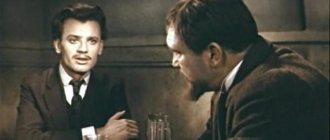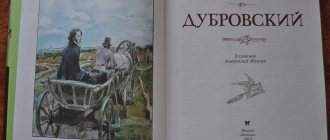History of creation
Writer Maxim Gorky
“Old Woman Izergil” is part of a series of romantic stories written by Gorky. This work was created in 1891 during a trip to Bessarabia. Literary scholars consider it an example of the author's early work. The main motives and distinctive features of Gorky are visible in this work. It includes three short stories, united by a common concept. Through three legends, the author describes the value of human life. The images of the heroes - Izergil, Danko and Larra - help to understand the writer’s attitude towards human freedom.
The legend about Larra presents the reader with the characteristics of an egoist with a lot of negative qualities. To achieve his goal, the young man goes to any lengths, demonstrating what permissiveness leads to. In this respect, he is contrasted with Danko, who chooses self-sacrifice as the only right decision in life. The old woman Izergil personifies reality, which Gorky allows readers to judge. The meaning of human life is the main theme of the work, which the author discusses while introducing the audience to the characters.
"Old Isergil"
Larra and Danko
The story has a beginning typical of romantic works. The action takes place in nature. The story is narrated by an elderly Moldavian woman, whose life is built according to her own laws. The old woman is reminded of the legend of Larra by a passing cloud.
The hero's biography is extraordinary. He was the son of an eagle and a simple woman. His father kidnapped the girl at a young age and made him his wife. Larra’s mother returned to the family twenty years later, when her betrothed died after crashing into the rocks. The son of the courageous eagle was with her. Loneliness and life outside of society are destined for the hero, who is ruled by pride. He put himself above those around him. The hero’s psychology differed from the psychology of his fellow tribesmen, which made him redundant among them.
Standing out from the crowd, Larra allowed himself to commit a crime, the punishment for which was inevitable. He became interested in the elder's daughter, and when she refused the young man, he killed the girl in front of everyone. The eagle's son did not lose his composure at this moment. The act remained unsolved by people. Proud and selfish Larra could not forgive the refusal. The hero's decisions were dictated by his origin. The eagle's genes called for self-exaltation. The elders sought punishment for the young man for a long time. One of the judges decided that they would have full freedom.
Larra
First among all, he could not be so alone. “Rejected” - this has been the meaning of the name Larra since then. He wandered the earth alone. At first, the hero liked this existence. But one day the young man reappeared in the tribe, and it became clear that he longed for death. No one dared to give Larra such redemption. The young man tried to kill himself with a knife, but the weapon did not give in to him, as his body turned into a shadow. To this day, he walks the earth's expanses, finding no peace.
Gorky exalted service to people above all else, so in his mind Larra is an anti-hero for whom no justification can be found. The son of an eagle cannot live according to human laws. But he is not a bird, but a man. This is the tragedy of the hero predicted by his birth.
Illustration for the book “Old Woman Izergil”
Larra personifies lack of spirituality, presenting himself as an ideal and violating the laws of human society. In the absence of human destiny, he finds no peace and is doomed to eternal wandering. Larra’s eyes, which the old woman Izergil described in detail, symbolize his character. Cold and full of pride, they distinguish the young man from everyone else. Boundless pride permeates the image of Larra and is visible in his actions.
Aphorisms in the Work of the Old Woman Izergil
Here are collected aphorisms from the works of A.M. Gorky.
Source: book “Winged Words” by N.S. Ashukin and M. G. Ashukina.
The expression “Winged words” goes back to Homer, in whose poems “Iliad” and “Odyssey” it occurs many times: “...He spoke a winged word...”, “... They exchanged winged words quietly among themselves...” Homer called the words “winged” because that from the mouth of the speaker they seem to fly to the ear of the listener. This term denotes short quotes from literary sources included in our speech, figurative expressions, sayings of historical figures, names of mythological and literary characters that have become household names.
A
Was there a boy? Used when there is doubt about the presence of the item itself, which has given cause for concern or trouble (ironically). From the novel “The Life of Klim Samgin” (Part 1, Chapter 1). The novel contains an episode from the protagonist's childhood. The boy Klim and his comrades - Boris Varavka and Varya Somova - were skating. Suddenly the ice broke, and Boris and Varya found themselves in the water. Klim tried to save them, handed Boris the end of his gymnasium belt, but, feeling that he was being pulled into the water, he let go of the belt. The children drowned. When the adults found out about the misfortune, the search for the drowned began, and Klim heard what struck him was “someone’s serious, incredulous question: “Was there a boy, maybe there wasn’t a boy.”
And you will live on earth - / They live like blind worms: / They will not tell tales about you, / They will not sing songs about you! Ironically about colorless people who have neither high goals nor creative interests. Sometimes the first two lines of this quatrain are quoted, more often the last two. The last lines of a poem by Maxim Gorky, which, without any title, was originally included in his story “About the Little Fairy and the Young Shepherd” (1895). The story was later republished under different titles: “The Wallachian Legend”, “The Fisherman and the Fairy”, “The Fairy”, “The Legend of Marco”.
B
To the madness of the brave we sing a song Ironically about someone who is brave, determined, but unreasonable. an act that is questionable from the point of view of the result. The original source is the prose poem “Song of the Falcon” (1898): The madness of the brave is the wisdom of life! We sing glory to the madness of the brave. The catchphrase was formed by combining a line from this work with its title. Petrel of the Revolution Playfully and ironically about the leader of the opposition, a troublemaker in the team, etc. This expression was first found in the illegal leaflet “Land and Freedom” No. 2 (1878) published by Narodnaya Volya. But it became widely known thanks to Maxim Gorky and his “Song of the Petrel” (1901). After its publication, the image of the Petrel became a symbol of the approaching revolution. And already at the end of March 1901, the writer Leonid Andreev, in a letter to Maxim Gorky, informed him that an article had appeared in Moscow in which the author of the “Song” himself was called “Petrel”. Hence the expression “Petrel of the Revolution,” which was often applied to Gorky after the October Revolution of 1917.
Former people Before the revolution of 1917, this was the name given to tramps, tramps and other representatives of the social bottom. After the October Revolution of 1917, this expression began to be applied (in a truncated form - “former”) to nobles, officials, intelligentsia, etc. The title of the story (1897) by Maxim Gorky.
IN
There is always a place for heroic deeds in life. It is used humorously and ironically, as encouragement for a difficult, almost impossible undertaking, and also in relation to oneself: nothing is lost, we also still have great things to do (self-ironically). From the story “Old Woman Izergil” (first published in the Samara Newspaper, April 1895). The words of the old gypsy woman Izergil, who tells the author about one of her many lovers whom she knew in her youth, about a Pole - “a worthy gentleman with a hacked-up face” who fought against the Turks on the side of the Greeks. In the original: “What are the Greeks to him if he is a Pole? Here's what: he loved exploits. And when a person loves feats, he always knows how to do them and will find where it is possible. In life, you know, there is always room for exploits. And those who do not find them for themselves are simply lazy and cowards, or do not understand life, because if people understood life, everyone would want to leave behind their shadow in it. And then life would not devour people without a trace. »
You can’t go far in the carriage of the past . It is quoted when they want to say that new forms of life and methods of action must correspond to new times, that one cannot live by old merits or old memories, one must act here and now. From the play “At the Lower Depths” (1902). Words of Satin (act. 4). In the original: You can't go anywhere in the carriage of the past.
D
Children are the flowers of life The expression was based on the phrase “children are the living flowers of the earth” from the story “Former People” (1897).
E
If you take a little from a lot, / This is not theft, but simply sharing. Serves as a humorous justification for any illegal borrowing. From “Tales of Italy” (1911 – 1913). In the original, this couplet is given as a quote from an Italian song: When you take a little from a lot, this is not theft, but simply sharing.
M
My universities Allegorically: about personal life experiences that shaped a person’s personality, beliefs, and principles. Title of an autobiographical story (1923). This is how the writer talks about the “school of life” that he went through while working for different people.
N
At the bottom Allegorically about the lowest rung of the social ladder, about the actual “falling out” of normal life. The title of Maxim Gorky's play "At the Depths", first staged (December 18, 1902) on the stage of the Moscow Art Theater. The first edition of the play, published a little earlier in the same year in Munich (Germany), was called “At the Bottom of Life” by Gorky. As Ivan Bunin recalled (“From Notes”), the writer Leonid Andreev advised Gorky to give the play exactly this, more expressive title – “At the Depths” instead of “At the Depths of Life”.
ABOUT
O brave Falcon, in the fight against your enemies you bled to death. From the prose poem “Song of the Falcon” (1898). The image of Falcon is the image of a rebel and revolutionary leading a selfless struggle. The poem was very popular in 1901 - 1903: it was read from the stage, quoted, and evoked imitation. The above quotation was repeatedly used in Bolshevik newspapers, proclamations, etc.
Let the storm blow harder! Allegorically about the desire for cleansing shocks and changes. From the prose poem “Song of the Petrel” (1901), in which the call to revolutionary struggle is expressed in the language of symbols: “Storm! A storm is coming soon! – This brave Petrel proudly soars between the lightning over the angry roaring sea; then the prophet of victory shouts: “Let the storm blow stronger.” »
R
One born to crawl cannot fly. Usually quoted when it comes to determining the political or moral position of a cultural figure in any social conflict (ironically). From the prose poem “Song of the Falcon.” It is possible that Gorky used a similar expression from the fable “The Peasant and the Cow” by the Russian fabulist of the 18th century. Ivan Ivanovich Khemnitser (1745–1784). The fable tells how one day a man decided to saddle a cow and ride on it, but she “fell” under the rider: The cow did not learn to gallop. And therefore it should be known: He who was born to crawl cannot fly.
WITH
Who are you with, masters of culture? Title of the article (1932) by Maxim Gorky.
Lead abominations From the autobiographical story (chapter 2) “Childhood” (1913–1914) by Maxim Gorky, who so called “that close, stuffy circle of terrible impressions in which he lived. a simple Russian man."
The sun rises and sets Allegorically about the passage of time, which is not filled with anything interesting or useful (ironic). The beginning of a famous folk song at the end of the 19th century. It became especially popular after it was performed on the stage in Maxim Gorky’s play “At the Lower Depths” (premiere: December 18, 1902, Moscow Art Theater): The sun rises and sets, But it’s dark in my prison. Day and night sentries guard my window.
H
Man - it sounds proudly From the play “At the Lower Depths” (1902), Satin’s words (act. 4): “Man! It's great! It sounds. proudly! Human! You have to respect the person."



